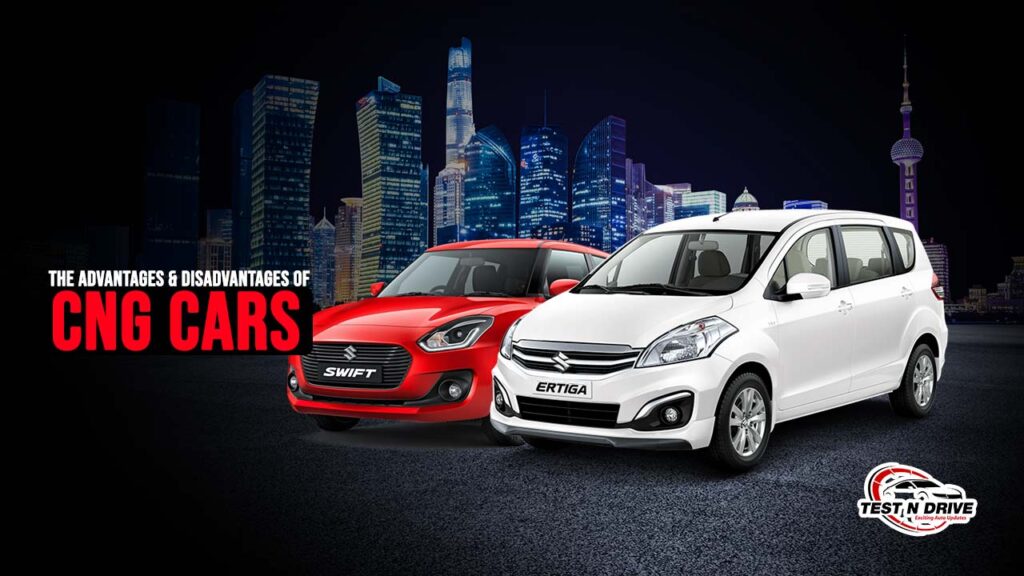CNG, or compressed natural gas, is a fuel that can be used instead of gasoline and diesel. In comparison to petrol and diesel, it releases fewer harmful emissions during burning. This article will look at the benefits and detriments(drawbacks) of CNG. The beginning time of CNG isn’t new; it’s practically over a multi-decade that CNG has been working and accessible in India, yet their inescapability has really filled in the last 4-5 years. The following shows the advantages and disadvantages of CNG Cars for the user to consider their choice of vehicle for the future. As indicated by the Economic Times, various variables have added to the expansion in deals of these vehicles.
Advantages and Disadvantages of CNG Cars – Should you buy?
Rising fuel and diesel costs, government projects like the Natural Gas Infrastructure Development Plan, and expanded public mindfulness about contamination have provoked more vehicle proprietors to change to CNG vehicles. Undoubtedly, the public power needs to update their market attack to the point that CNG cars address one out of each two vehicles sold in India by 2030. So, below are the some of the advantages and disadvantages of using CNG in cars:
Advantages Of CNG Cars
1. Cleaner fuel
There are so many compound control gases like Sulphur, particulate matter, advancements of significant metals, and other terrible mixes that are by and large missing in CNG, which could corrupt your engine oil.
2. Environmental benefits
When diverged from conventional fuel and diesel, CNG consumes all the more spotless. Interestingly, carbon monoxide outpourings are diminished by around 80% with gas-fuelled vehicles, and 44 percent fewer hydrocarbons are made. Moreover, CNG vehicles are quieter than gas and diesel vehicles, achieving decreased noise tainting.
3. Safety
In case of an impact, CNG chambers are less risky than fuel and diesel tanks due to their size, construction, and area inside the vehicle. These chambers have achievement contraptions which are depended upon to pass on the gas enduring that there is a higher than common strain or temperature. Accepting there should arise an occasion of an opening, CNG is lighter than air, inferring that it will disperse as high as could really be expected, rather than gas or diesel, which pools on the ground and fills in as a fire peril.
4. Less damage to the car
CNG burning produces practically zero build-ups when contrasted with standard gas and diesel. This infers that the motor’s lines and cylinders are less inclined to be harmed.
5. Better performance
Since petrol gas has an octane rating of around 130, while super and unleaded have octane assessments of 95 and 98, freely, certified burnable gas engines beat fuel engines. The normal increments of using (CNG) are sure. Many more folks are expected to be interested in getting a CNG conversion kit or acquiring CNG vehicles in the future.
6. Economic benefits
CNG is a more sensible fuel than petrol and diesel. On the off chance that a vehicle’s commonplace fuel use is 8 litres for every 100 kilometers, it would associate with 10 litres for every 100 kilometres whenever changed over to LPG. Nonetheless, changing it over to CNG will bring about a methane utilization of 5,5kg/100 km. The financial benefits of converting to CNG are self-evident.
Disadvantages and Problems with CNG Cars
1. Decreased Power Output
One critical weakness of CNG is its lower power yield. You’ll see a major distinction in power yield if you’re accustomed to driving a petroleum vehicle. You will notice a big loss in power the day you switch to CNG, especially on long summer journeys when the air conditioning is at its maximum.
2. Decreased Resale value
You can avoid this issue if you identify a suitable buyer. Expect a value drop if you have a CNG Conversion Kit introduced in your vehicle and plan to offer it to a seller. This can likewise be profitable. In the event that you’re looking hand vehicle briefly, a CNG vehicle is more affordable than a fuel vehicle! This is also one of the major disadvantages of using CNG in cars. This depends on how a person can bargain with the customer.
3. Reduce Boot Space
The biggest disservice for CNG vehicle proprietors is the absence of a freight limit. There are events when you are left with practically no boot room, especially in hatchbacks and vehicles under 4 meters. In the event that you wish to introduce CNG, we suggest buying a vehicle assuming you often go on extensive outings. This is one of the main disadvantages of CNG conversion kits in petrol cars.
4. Hydro-testing
One more critical drawback of CNG is that your chamber needs to be seen at regular intervals. This is a necessary test to guarantee that your CNG chamber is safe to use. Do you have an extended weekend only for this test in the current expedient world? You settle on the decision!
5. Long weight for filling
One more problem with CNG vehicles is that you should stand by longer than you would, assuming you were utilizing fuel. Considering that it is currently 2021, numerous new CNG stations have opened. However, the quantity of CNG vehicles has likewise expanded. Overall, you will undoubtedly have to wait longer than at a gas station. Is the time spent waiting worth the money saved on gas? It’s entirely up to you.
The above article shows the advantages and disadvantages of CNG cars in India. Also, findings show that using CNG in public transportation can help to enhance urban air quality, reduce negative health consequences, and lower the social costs of air pollution. CNG vehicles create fewer greenhouse gases than typical gasoline and diesel vehicles on a well-to-wheels basis. This is why Transport Ministry also issued a notification to allow CNG Conversion Kits for vehicles of BS-VI Vehicles.
So, using the CNG vehicle can help improve the air quality of the environment, reduce the risk of respiratory and other health issues, and, most importantly, reduce extra fuel expenses.






